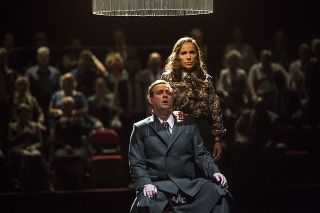|
Back
Hotel Macbeth Bruxelles
Palais de la Monnaie
09/13/2016 - & September 15, 18, 21, 23, 25, 27, 29*, 2016
Giuseppe Verdi: Macbeth
Scott Hendricks (Macbeth), Carlo Colombara (Banco), Béatrice Uria-Monzon (Lady Macbeth), Lies Vandewege (Dama di Lady Macbeth), Andrew Richards (Macduff), Julian Hubbard (Malcolm), Justin Hopkins (Medico, Servo, Araldo), Gérard Lavalle (Sicario), Jacques Does, Maria Portela Larisch, Boyan Delattre (Apparizioni)
Académie de chœur de la Monnaie, Chœurs de la Monnaie, Martino Faggiani (chorus master), Orchestre symphonique de la Monnaie, Paolo Carignani (conductor)
Olivier Fredj (director, scenography), Jean Lecointre (graphic art director), Gaspard Pinta, Massimo Troncanetti (scenography), Frédéric Llinares (costumes), Christophe Forey (lighting), Dominique Boivin (choreography)

S. Hendricks, B. Uria-Monzon (© Bernd Uhlig)
This is the second season that La Monnaie is undergoing renovations. Though well organized and quite functional, the makeshift theatre is not close to the historic centre and has acoustics not worthy of the venerable La Monnaie. Stage director Olivier Fredj has opted for a psycho-analytical vision. A reading of the program is requisite for an understanding of his interpretation of the work. He sees the witches as the id, Macbeth as the ego and Lady Macbeth as the super ego. Perhaps it is with this in mind that Fredj removed the chorus, who represent the witches, off the stage and replaced them with a pantomime of phantasmagoric characters dressed in original clothes that are a hybrid between the sixties and science fiction. However, this choice did not work in most scenes and was generally tedious. The exception was the witches’ scene in the third act where they summon the spirits that foresee Macbeth’s future. It took place in what seemed like a spa. The witches poured potions into a tub from which the spirits arose to great effect. More surprising was the change of Macbeth’s castle into an Art Deco hotel. The changed location afforded visually pleasant sets. It also made Lady Macbeth appear as a nasty supervisor of the hotel staff, not necessarily the stuff of murderous ambition. Beyond that, there was little dramatic improvement from the change of period and locale. The murder of Banco took place in the hotel’s kitchen and the murderers were the hotel staff. The banquet scene had only four guests and plenty of empty seats, possibly a sign of disapproval by the nobility. Yet, such a small audience should not have stressed Macbeth and driven him into histrionics upon seeing the ghost.
In contrast to the confusing staging, the two leading singers were exceptional both vocally and dramatically. Mezzo Béatrice Uria-Monzon joins a long line of mezzos with an ease in the upper register, including Christa Ludwig, Grace Bumbry, Shirley Verrett and Fiorenza Cossotto, who have excelled in this role. This was Uria-Monzon’s auspicious debut in the role. Given her enormous success, she is likely to include it in her repertoire. She had a total vocal grasp of the role, at ease in the lower parts of the role, and more surprisingly she had absolutely no difficulty in the coloratura passages of the banquet scene. Her spoken lines in the opening letter scene, “Nel dì della vittoria”, were a succinct way of introducing the kind of Lady she was: pragmatic and amoral. Dramatically, Uria-Monzon was a stunning interpreter. She was totally convincing as the ruthless accomplice and instigator and extremely moving in the somnambulism scene, “Una macchia è qui tutt’ora”. The Macbeth, Scott Hendricks had a true Verdi baritone voice, velvety and virile. He may have seemed to lack Lady Macbeth’s stage presence, but such a contrast between the weak Macbeth and his domineering wife is necessary. He was able to effectively convey the usurper’s reluctant ambition, then guilt and finally despair. His moving final aria “Pietà, rispetto, amore” was marvellously intense. Despite a rich voice, bass Carlo Colombara lacked refinement as Banco. Andrew Richards impressed with his aria, “O figli miei”. The long hidden chorus, here representing Scots fleeing Macbeth’s oppressive rule, appeared in the aisles during the fourth act “Patria oppressa” to the public’s great enthusiasm. Despite a lack of brillance in the strings section, conductor Paolo Carignani led La Monnaie’s orchestra with panache.
Ossama el Naggar
|